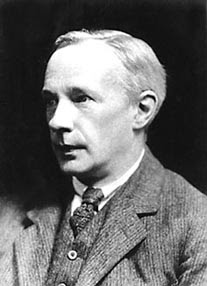
George Edward Moore
The Cambridge philosopher George Edward Moore (1873-1958) is strongly associated with the advocacy of “realist” commonsense. Together with his acquaintance Bertrand Russell, he originated the analytical philosophy that took strong root in Britain. There was a difference in the outreach of those two entities. Russell became an international figure, whereas the influence of Moore was largely confined to Britain.
Both Moore and Russell started their academic career at Cambridge as neo-Hegelians. These inhabitants of Trinity College were inheritors of the nineteenth century overspill from German idealism, a format found in British philosophy by the end of that century. Moore went to study at Trinity in 1892, adding philosophy to classics. There he met Russell and J. M. E. McTaggart (1866-1925), the latter a critical Hegelian and a lecturer at Trinity. Moore subsequently broke away from the influence of McTaggart (who eventually reaped a strong degree of oblivion for many years). This development prompted Russell’s similar revolt against the idealism of McTaggart. Yet unlike Russell, Moore nurtured a continuing aversion for empiricism, a trait which he acquired from the neo-Hegelians.
In his dissertation of 1898, Moore turned against Kantian idealism, confirming his new angle in realism. He became a Fellow of Trinity, and eventually a lecturer. His intellectual development is not straightforward, and has been subject to some generalisations. Only his friend Russell identified fully with the empiricist tradition stemming from Locke, Berkeley, and Hume. However, Moore did share in the “realist” reliance on sense data, which now became the operative mode of analysis, disdaining metaphysical elements.
While Russell moved into the technical world of mathematical logic, Moore established an analytical approach to ethical problems in Principia Ethica (1903), which transpired to be his most famous work. He has been credited with a “Platonistic” view of good as an objective but indefinable property. In this work he argued that ethical disputes cannot be resolved by criteria of the natural or social sciences; ethical values should be acknowledged in their own right.
From 1925 to 1939, Moore was Professor of Philosophy and Logic at Cambridge. By that time he had developed his “commonsense” realist position, first explicitly expressed in lectures of 1910-11. Here he remarked: “What is most amazing and most interesting about the views of many philosophers, is the way in which they go beyond or positively contradict the views of Common Sense” (Moore 1953:2).
This attitude was consolidated in his subsequent paper A Defence of Commonsense (1925). He was not a systematic philosopher. “Moore’s legacy is primarily a collection of arguments, puzzles and challenges” (Tom Baldwin, “George Edward Moore,” Stanford Encyclopedia of Philosophy).
Moore was a friend of Wittgenstein, possessing a different temperament. They were not always in agreement. In other directions, Moore rejected the logical positivism that gained strong ground at Oxford via such entities as Alfred J. Ayer.
“Although Moore always denied that philosophy is just analysis, there is no denying that it [analysis] plays a central role in his philosophy” (Baldwin, article last linked). Moore felt that the commonsense boundaries of experience were sufficient to explain existence. He exercised a strong influence on the Oxford academic philosophers, firstly the logical positivist wave, and afterwards the linguistic analysts like J. L. Austin.
Accusations have been made that philosophy became “talk about talk,” a phrase associated with the analysis of concepts and speech. That disposition has frequently been critical of anything idealist or rationalist, or even scientific. Moore was content to analyse statements in ordinary language, without relying on science or any form of technical logic. This commonsense outlook was favoured by the Oxford philosopher J. L. Austin, who furthered the resistant attitude to logical positivism (and criteria of scientific standards dominating speech). The new trend viewed “philosophical problems” as confusions caused by the inappropriate use of language; the unravelling of the confusion via linguistic analysis was now believed by Austin and others to dissolve the problems.
The mergence of commonsense and linguistic analysis has been criticised in other directions, as not being any path to deliverance from problems. The nature of commonsense analysis has come under attack for being a simplistic mode, not the ultimate recourse. For instance, “modern science has shown that behind our moment-to-moment experience of the everyday world teem truths and realities that commonsense is totally unaware of, that are frequently astounding and often counter-intuitive, and sometimes deeply difficult to grasp even when we know them to be true” (Magee 1998:52).
The attack on commonsense advocacy in British philosophy alighted upon Bertrand Russell’s denial of commonsense in his well known book The Problems of Philosophy (1912). Russell here emphatically stated: “Commonsense leaves us completely in the dark as to the true intrinsic nature of physical objects.”
Professor Bryan Magee reflected: “The greatest tragedy of academic philosophy in the twentieth century in the English-speaking world is that it was developed as a profession largely by people to whom these things were not obvious, people who did not themselves have philosophical problems and who – perhaps for that reason – operated with a commonsense view of the world, and equated philosophical activity with conceptual analysis” (Magee 1998:53).
A further observation is that the alternatives to commonsense philosophy seemed to be contradicted by religious elements, the absolute idealism of Hegel, and the oracular writings of Nietzsche (ibid). Therefore everything else was eschewed as inferior or confusing.
British conceptual analysis (or “commonsense”) leaves rather large areas of questioning in matters that should not be taken for granted. For instance, the Magee formulation prompts a query as to the identity of the people who do experience “philosophical problems.”
Bibliography
Ayer, Alfred J., Russell and Moore: The Analytical Heritage (Harvard University Press, 1971).
Baldwin, Tom, G. E. Moore (London: Routledge, 1990).
Baldwin, Tom, ed., G.E. Moore: Selected Writings (London: Routledge, 1993).
Magee, Bryan, Confessions of a Philosopher (London: Phoenix, 1998).
Moore, George Edward, Principia Ethica (Cambridge University Press, 1903).
——–Some Main Problems of Philosophy (London: George Allen & Unwin, 1953).
Schilpp, Paul A., ed., The Philosophy of G. E. Moore (Northwestern University Press, 1942).
Kevin R. D. Shepherd
December 8th 2009
ENTRY no. 4
Copyright © 2009 Kevin R. D. Shepherd. All Rights Reserved.

